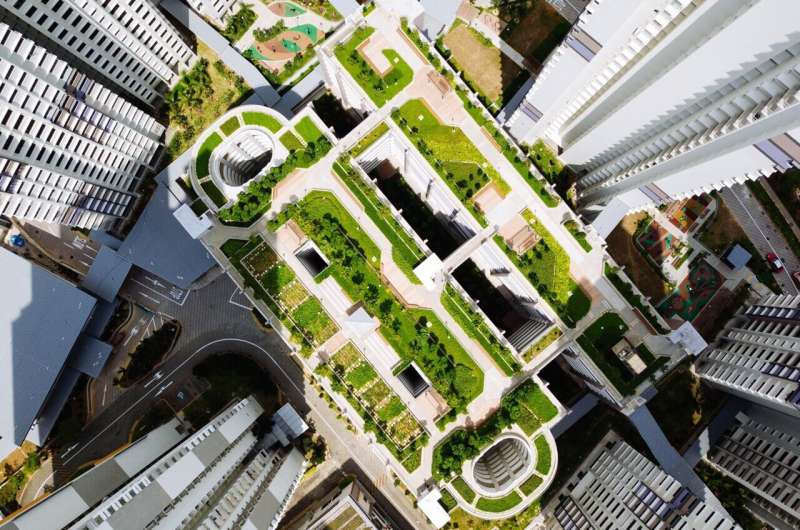This article has been reviewed according to Science X's editorial process and policies. Editors have highlighted the following attributes while ensuring the content's credibility:
fact-checked
trusted source
written by researcher(s)
proofread
Opinion: Planning smart and sustainable cities should not result in exclusive garden utopias for the rich

One of the big ideas of the 21st century, "smart cities" promised a new world of connected, data-driven and sustainable urbanism. Pervasive digital infrastructures would monitor flows from sewage to traffic to criminal activities, providing information in real time and anticipating and preventing risks.
However, in practice, smart cities have been disappointing. Schemes like Alphabet's failed "city built from the Internet, up" was criticized for being opportunistic data grabs. And many other smart city projects have been fragmented and unimpressive
But smart cities have not gone away. A new generation of "AI cities," or what I call "platform cities," is emerging. Platform corporations like Amazon, Alphabet and Huawei are already transforming cities by exploiting people and places through data extraction and surveillance. Now, they want to build and manage cities.
Eric Schmidt, former chief executive officer of Alphabet Inc., asked people to imagine "all of these things that we could do if someone would just give us a city and put us in charge." Corporations want control of cities, and following the example of Singapore, the world's only smart nation, many platform cities want to be something more like city-states.
There are multiple plans for these new smart settlements as public-private partnerships (PPPs) or entirely private entities. One proposal, which contained many of the common features of platform cities, emerged in 2021. The state of Nevada considered a proposal that would have allowed companies owning 78 square miles (202 square kilometers) of land to become innovation zones (IZs). These zones would have had the legislative powers held by counties, including raising taxes and running school districts, courts and police forces.
While the proposal did not pass, it continues to be studied by the state. Other similar efforts are emerging, including the Solano County development in California, and the proposed Telosa, developed by the ex-CEO of Walmart.
New political systems
Platform cities share several core elements. The first is separation from the surrounding political environment. For example, according to its charter, Próspera in Honduras would be allowed to operate its own intelligence services and to call on external military assistance.
The second is a new kind of entrepreneurial citizenship, which favors low taxes and property rights over democracy and human rights. Again, in Próspera's charter, property ownership determines the number of votes.
The third is ubiquitous data collection and surveillance. For example, marketing material for the desert city of NEOM in Saudi Arabia claimed that the city would collect 90% of all data in order to support lifestyle improvements for residents.
Fourth, platform cities share a bland globalist outlook with common aesthetic and design features generated by famous architectural firms like Zaha Hadid Partners, BIG and Norman Foster (an original member of the NEOM advisory board).
In a more sinister way, these cities also emphasize the social and political homogeneity of proposed residents. While there are frequent references to "multiculturalism," for cities in Majority World countries, this seems to mean whiter than the surrounding populations.
This links to the fifth and final commonality: a highly exclusionary outlook, favoring protection of residents over the welfare of humanity as a whole. The design of these cities often hide distributed and networked technologies of surveillance, in which ubiquitous surveillance as part of a luxury lifestyle also secures residents from outside threats.
Political context
For Próspera, an overt form of neo-colonialism was envisioned: the first project was proposed on the island of Roatán. Existing poor and Indigenous residents were to be integrated as minimum-waged service workers, although the platform only presented this as development.
Like Arizona's IZs, Próspera's Roatán development has been shelved, but the company continues legal battles with the Honduran government. Telosa remains on the drawing board.
Manipulating the popular imagination of new technologies like AI allows longstanding elite fantasies of separate government to become acceptable and mainstream. The political environments favored by platform city developers seem to be either strong authoritarian governments that can override objections—as with NEOM—or relatively impoverished and weak governments seen as easy to manipulate, as with Próspera.
It might appear contradictory that neoliberal, even libertarian, tech CEOs would support either authoritarian regimes or developments. However, as contemporary historian Quinn Slobodian has shown, neoliberal thinking supports democracy only as long as it is not a hazard to the free market.
There is also the growing ideological influence of what computer scientist Timnit Gebru and philosopher Emilé P. Torres have described as "TESCREAL": transhumanism, extropianism, singularitarianism, (modern) cosmism, rationalism, effective altruism and longtermism. This is an increasingly coherent bundle of beliefs advocating for the survival of a select elite of technologically savvy people over environmental and social justice for all people.
AI-based platform cities are being sold as innovative projects for a common future. But they look more like exclusive communities to protect the rich from future catastrophes. In these protected, inwardly secure and sustainable cities, a technologically enhanced elite would survive and prosper, while the rest of humanity would be forced to fend for itself.
Provided by The Conversation
This article is republished from The Conversation under a Creative Commons license. Read the original article.![]()



















